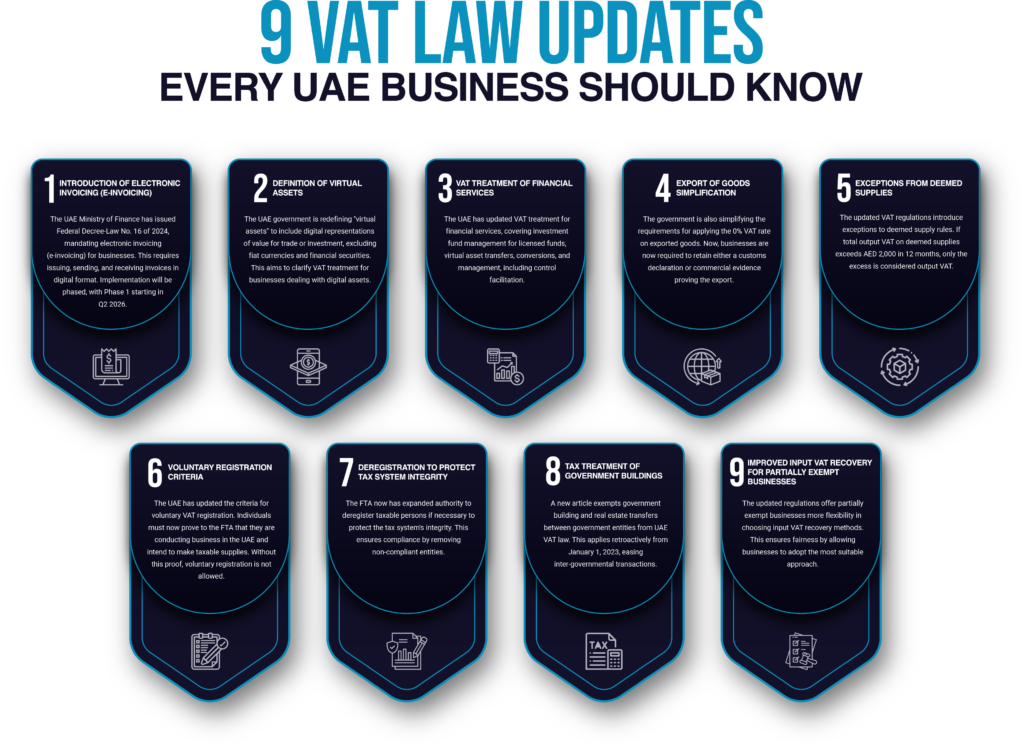9 VAT Law Updates Every UAE Business Should Know

The United Arab Emirates (UAE) has recently implemented updates to its Value Added Tax (VAT) laws. They are introducing over 30 amendments that impact various industries.
These changes, in effect from November 15, 2024, aim to align with international tax standards.
So, here are 9 of those VAT law updates in the UAE.
Introduction of Electronic Invoicing (E-Invoicing)

The UAE Ministry of Finance has issued Federal Decree-Law No. 16 of 2024. This marks the commencement of electronic invoicing (e-invoicing) in the UAE.
Basically, this law mandates that businesses issue, send, and receive invoices in an electronic format.
Lastly, the implementation of e-invoicing is scheduled in phases, with Phase 1 expected to commence in the second quarter of 2026.
Definition of Virtual Assets
The UAE government is introducing a new definition for “virtual assets”. This will include digital representations of a value that can be traded or converted and used for investment purposes.
Secondly, this definition excludes digital representations of fiat currencies or financial securities.
This clarification is for businesses that deal with digital assets. It will determine the VAT treatment applicable to such transactions.
VAT Treatment of Financial Services
The VAT treatment of financial services has been updated to include:
- Providing investment fund management services independently for a fee, for funds licensed by a competent authority in the UAE.
- Transferring ownership of virtual assets, including virtual currencies.
- Conversion of virtual assets.
- Managing virtual assets and enabling control over them.
Export of Goods Simplification
Exceptions from Deemed Supplies
Here’s another VAT law update.
The updated VAT regulations have introduced exceptions to the deemed supply provisions.
If the total output VAT due for all deemed supplies for a taxable person within a 12-month period exceeds AED 2,000, the VAT amount exceeding AED 2,000 is considered output VAT.
Voluntary Registration Criteria
The criteria for voluntary VAT registration has also been updated. Now, an individual may not register voluntarily unless they can prove to the Federal Tax Authority (FTA) that they are carrying on a business in the UAE and have the intention to make taxable supplies.
Deregistration to Protect Tax System Integrity
The FTA now holds additional authority to deregister a taxable person if it deems such action necessary to protect the integrity of the tax system.
This provision gives the FTA the authority to maintain a compliant tax environment by removing non-compliant entities.
Tax Treatment of Government Buildings

A new article specifies that the transfer of ownership or disposal of government buildings, real estate assets, and similar projects between government entities is not considered a supply under UAE VAT law.
This exemption applies retrospectively from January 1, 2023, and aims to facilitate inter-governmental transactions without VAT implications.
Improved Input VAT Recovery for Partially Exempt Businesses
The updated regulations will give more flexibility for partially exempt businesses in determining their input VAT recovery methods.
This change allows businesses to adopt a recovery method that best suits their operations, promoting fairness in VAT recovery.













